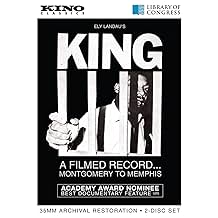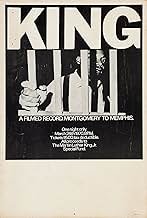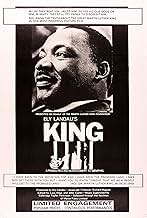King: de Montgomery à Memphis
Titre original : King: A Filmed Record... Montgomery to Memphis
- 1969
- 3h 5min
NOTE IMDb
8,2/10
684
MA NOTE
Ce documentaire retrace la vie de Martin Luther King et de ses décennies d'activisme en faveur des droits civiques.Ce documentaire retrace la vie de Martin Luther King et de ses décennies d'activisme en faveur des droits civiques.Ce documentaire retrace la vie de Martin Luther King et de ses décennies d'activisme en faveur des droits civiques.
- Réalisation
- Scénario
- Casting principal
- Nommé pour 1 Oscar
- 1 victoire et 1 nomination au total
Martin Luther King
- Self
- (images d'archives)
Ralph Abernathy
- Self
- (images d'archives)
James Baldwin
- Self
- (images d'archives)
Tony Bennett
- Self
- (images d'archives)
Leonard Bernstein
- Self
- (images d'archives)
Marlon Brando
- Self
- (images d'archives)
H. Rap Brown
- Self
- (images d'archives)
Avis à la une
It's a documentary of Martin Luther King, Jr.'s life from 1955 to his death in 1968. Except for his first speech at the beginning of the Montgomery Bus Boycott, it is primarily news footage and coverage of his best-known activities during those years and the local circumstances that brought about those activities. The Montgomery speech is audio only. That is both its strength and limitation.
This film is one of the few places you can still see and hear the entirety of King's "I Have a Dream" speech of 1963. There are numerous other memorable speeches; seeing him deliver them visually dramatically increases the impact. It is so focused on King, however, that you don't get an overview of the Civil Rights movement, especially those parts in which he had a limited profile, such as the Freedom Rides in 1961.
There is nothing about King's personal life or the work of his associates. To get better context, you need the background of a good biography like Jonathan Eig's "King: a Life." But to be bathed in M. L. King's oratory, this three-hour film is the place to go.
Some celebrities narrate brief segments intermittently. They are a distraction and add nothing.
This film is one of the few places you can still see and hear the entirety of King's "I Have a Dream" speech of 1963. There are numerous other memorable speeches; seeing him deliver them visually dramatically increases the impact. It is so focused on King, however, that you don't get an overview of the Civil Rights movement, especially those parts in which he had a limited profile, such as the Freedom Rides in 1961.
There is nothing about King's personal life or the work of his associates. To get better context, you need the background of a good biography like Jonathan Eig's "King: a Life." But to be bathed in M. L. King's oratory, this three-hour film is the place to go.
Some celebrities narrate brief segments intermittently. They are a distraction and add nothing.
11/18/17. A bit on the long side, but at least you get the chance to listen to the entire "I have a dream." No denying that King was a force to be reckoned with. His oratory style is reminiscent of the fiery preacher of past, and still quite effective in inspiring its listeners to bigger and better things.
The version of this documentary I saw did not contain any of the celebrity "bridges" that Maltin mentioned in his review. The version I saw, ran only 103 minutes (as to the 185 of Maltin's version) and contained only archival footage of Dr. King's career from 1955 to 1968. This version is a pure video diary of King's speeches and marches. It contains amazingly powerful footage of the nonviolent protests and the final moments of King's life.
More than half a century after Dr. Martin Luther King Jr. was murdered, I finally looked at this movie. It is a collection of Dr. King's appearances and the events around him, interspersed with celebrities of the day speaking in admiration, edited by two of the leading film makers of the day with the assistance of two editors, attempting to make coherent sense of what, half a century later, is a senseless and evil situation and the effort to remedy it.
It's a huge effort, and brilliantly produced. "How Did We Get Here?" is a question that needs to be examined, if only for its cautionary value.
I looked at this off a TV presentation, skipping the commercial interruptions. I did notice the note "Viewer Discretion Warranted." I suppose people think truth is something people need to be discreet about. Recent events indicate that people have let the lessons I learned as a child drop out out their thoughts, and thereby permitted these hateful actions return. Yes, discretion is required. Otherwise people might remember, and remain silent about them.
It's a huge effort, and brilliantly produced. "How Did We Get Here?" is a question that needs to be examined, if only for its cautionary value.
I looked at this off a TV presentation, skipping the commercial interruptions. I did notice the note "Viewer Discretion Warranted." I suppose people think truth is something people need to be discreet about. Recent events indicate that people have let the lessons I learned as a child drop out out their thoughts, and thereby permitted these hateful actions return. Yes, discretion is required. Otherwise people might remember, and remain silent about them.
We just passed what would've been Martin Luther King, Jr.'s 90th birthday, so I decided to watch this documentary. You've heard about Martin Luther King, Jr. You've probably seen footage of some of his speeches. But to truly understand him, you have to see Sidney Lumet's Academy Award-nominated "King: A Filmed Record... Montgomery to Memphis". Originally screened as a one-night event, it's now available for home viewing. The documentary consists of footage of King starting with the bus boycott in Montgomery until his funeral, emphasizing how he called upon the United States to live up to the ideals that it professed. Whether addressing racial and class issues or coming out against the Vietnam War, he was on the front lines of justice every step of the way.
The documentary includes footage of people (Harry Belafonte, Ruby Dee, Paul Newman, Joanne Woodward, etc) quoting King. It emphasizes the diversity of people who stood on the side of morality. In an era when we see racism coming back to the fore - pushed by the current demagogue-in-chief - it's more important than ever to understand King's legacy. Definitely see this documentary.
The documentary includes footage of people (Harry Belafonte, Ruby Dee, Paul Newman, Joanne Woodward, etc) quoting King. It emphasizes the diversity of people who stood on the side of morality. In an era when we see racism coming back to the fore - pushed by the current demagogue-in-chief - it's more important than ever to understand King's legacy. Definitely see this documentary.
Le saviez-vous
- AnecdotesThis film originally was shown at theaters as a "one-time-only" event on 24 March 1970 and ran 3 hours and 5 minutes. The proceeds from the $5 admission price were donated to the Dr. Martin Luther King Jr. Special Fund. It was later shown on US television, unedited and with limited interruption.
- Versions alternativesA second version, edited down to 103 minutes, was released onto videotape. It is missing the celebrety narratives and an opening montage of clips of militant black leaders with violent rhetoric contrasting to clips of Dr. King's non-violent messages, but includes the original introduction by Harry Belefonte, and consists entirely of newsreel footage.
- ConnexionsFeatured in C'est assez noir pour vous?!? (2022)
Meilleurs choix
Connectez-vous pour évaluer et suivre la liste de favoris afin de recevoir des recommandations personnalisées
Détails
- Date de sortie
- Pays d’origine
- Langue
- Aussi connu sous le nom de
- King: A Filmed Record... Montgomery to Memphis
- Lieux de tournage
- Société de production
- Voir plus de crédits d'entreprise sur IMDbPro
- Durée
- 3h 5min(185 min)
- Couleur
- Mixage
- Rapport de forme
- 1.37 : 1
Contribuer à cette page
Suggérer une modification ou ajouter du contenu manquant








































